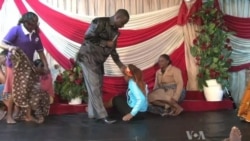NAIROBI —
As Christian churches grow in size and number in Kenya, they have created a growing industry of faith healers and televangelists. Concerns are also rising that these new churches exist only to exploit the poor and desperate. Kenyans are looking to spot the wicked among the righteous.
Exorcisms, twice weekly. That’s what’s being offered at the Around the Globe Ministry in downtown Nairobi --one of the many new faith healing churches.
Apostle Francis Musili said he used faith and prayer to heal the sick, find love for the forlorn and give hope to the hopeless by driving out demons that possessed their bodies and souls.
Is it a real demonstration of the power of prayer? Or just some elaborate scam?
Musili said the proof was with the parishioners.
“I don’t believe that in the middle of Kenya we have such foolish people who will just be fooled every day. If I’ve been fooling them for the last 30 years, I believe I’m a very good trickster," he said.
The Kenyan media in particular have been critical of faith healing churches as exploiters of the poor, by selling miracles for profit. Musili himself does not charge for the deliverance service.
But like many evangelists, he is expanding his reach through TV and radio. He runs a formidable broadcasting operation out of the church.
“Myself I would not say I’m poor, I’d be lying. I’m not poor, but I’m also not rich. I’d say whatever I have is to facilitate me to preach the Gospel,” admitted Musili.
So when do faith healers cross the line from miracle workers to predators preying on the poor?
Reverend Peter Karanja, head of The National Council of Churches of Kenya, an independent organization, said miracles can happen, but they should not be sold.
“So the moment someone tells you pay something so that I pray for you and you’ll get a blessing or a benefit, that alone is a reason for you to recognize that here, you are being exploited,” he said.
The more established churches in the country are also concerned that some new ministries can bring with them some bad influences.
At the Catholic Holy Family Basilica in Nairobi, Father Simon Ng’ang’a said church leaders were only human.
“There are a lot of mushrooming churches. Some are based on the tenants of Jesus Christ. But I can say, there are some people who are very capitalistic. And when they are preaching to the people. They are not looking for the good of the people. But they want to enrich themselves,” he said.
Musili himself admitted there were some bad actors in Kenya’s many churches, taking advantage of the most desperate.
His advice is not to judge any church - new or old - just because of a few swindlers. After all, he noted, everyone has their demons.
Exorcisms, twice weekly. That’s what’s being offered at the Around the Globe Ministry in downtown Nairobi --one of the many new faith healing churches.
Apostle Francis Musili said he used faith and prayer to heal the sick, find love for the forlorn and give hope to the hopeless by driving out demons that possessed their bodies and souls.
Is it a real demonstration of the power of prayer? Or just some elaborate scam?
Musili said the proof was with the parishioners.
“I don’t believe that in the middle of Kenya we have such foolish people who will just be fooled every day. If I’ve been fooling them for the last 30 years, I believe I’m a very good trickster," he said.
The Kenyan media in particular have been critical of faith healing churches as exploiters of the poor, by selling miracles for profit. Musili himself does not charge for the deliverance service.
But like many evangelists, he is expanding his reach through TV and radio. He runs a formidable broadcasting operation out of the church.
“Myself I would not say I’m poor, I’d be lying. I’m not poor, but I’m also not rich. I’d say whatever I have is to facilitate me to preach the Gospel,” admitted Musili.
So when do faith healers cross the line from miracle workers to predators preying on the poor?
Reverend Peter Karanja, head of The National Council of Churches of Kenya, an independent organization, said miracles can happen, but they should not be sold.
“So the moment someone tells you pay something so that I pray for you and you’ll get a blessing or a benefit, that alone is a reason for you to recognize that here, you are being exploited,” he said.
The more established churches in the country are also concerned that some new ministries can bring with them some bad influences.
At the Catholic Holy Family Basilica in Nairobi, Father Simon Ng’ang’a said church leaders were only human.
“There are a lot of mushrooming churches. Some are based on the tenants of Jesus Christ. But I can say, there are some people who are very capitalistic. And when they are preaching to the people. They are not looking for the good of the people. But they want to enrich themselves,” he said.
Musili himself admitted there were some bad actors in Kenya’s many churches, taking advantage of the most desperate.
His advice is not to judge any church - new or old - just because of a few swindlers. After all, he noted, everyone has their demons.





